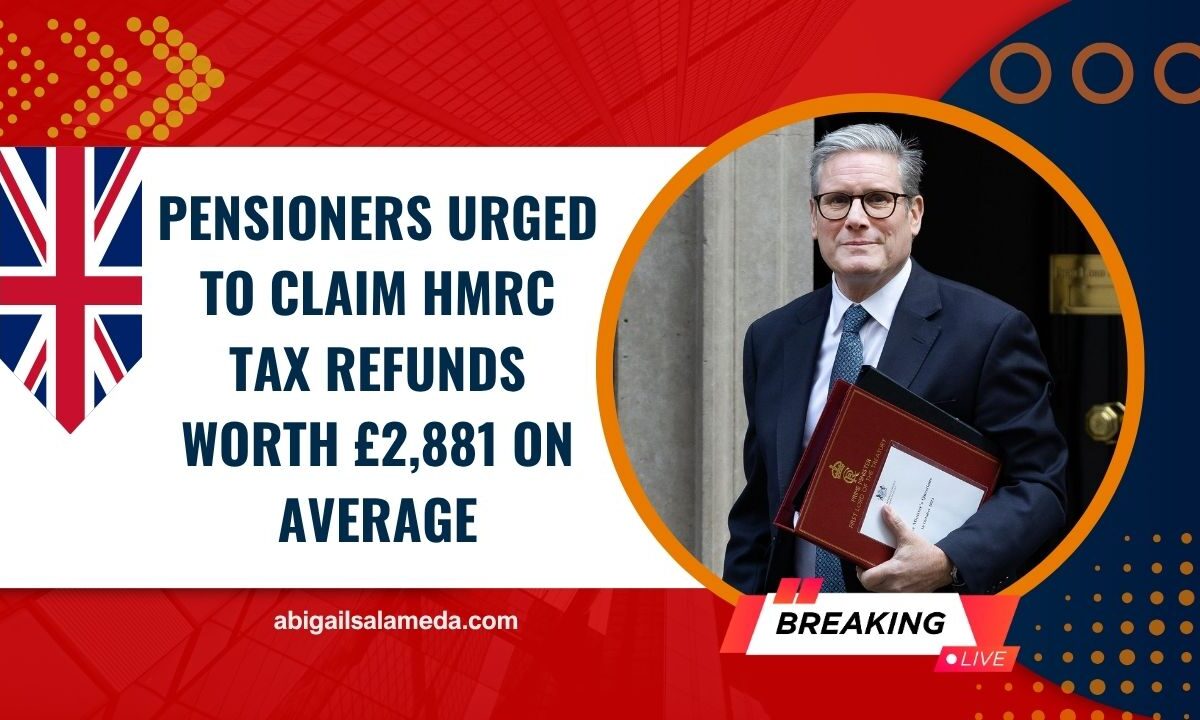Thousands of pensioners across the UK could be entitled to an average HMRC tax refund of £2,881, simply by reclaiming overpaid tax on pension withdrawals.
Between January and March 2025, HMRC refunded £44 million to retirees who had been incorrectly taxed when accessing their pension savings—bringing the total reclaimed since 2015 to over £1.4 billion.
If you’ve recently accessed your pension or plan to, it’s time to check if you’re due a refund—and learn how to avoid being overtaxed in the future.
Why Are Pensioners Being Overcharged?
Since the 2015 pension freedoms reforms, individuals over age 55 can flexibly withdraw from their pension pots. However, HMRC often applies an emergency tax code to the first withdrawal of the tax year, assuming it will be recurring monthly.
This leads to one-off lump sum withdrawals being taxed as if the same amount will be taken every month—resulting in significant overpayment.
Despite recent efforts to update tax codes more efficiently, single withdrawals are still frequently taxed incorrectly. Pensioners must therefore be proactive in checking their tax status and reclaiming any overpaid amounts.
Average Refunds and Overpayment Breakdown
| Period | Refunds Issued | Total Value | Average Refund |
|---|---|---|---|
| Jan – Mar 2025 | 15,200+ | £44 million | £2,881 |
| Since 2015 | 500,000+ | £1.4 billion+ | Varies annually |
These figures highlight the scale of the issue and the potential windfall for those who take the time to submit a claim.
How to Avoid Being Overtaxed
There’s a simple strategy that could save you from an unnecessary tax hit: make a small pension withdrawal first, even as little as £1. This prompts HMRC to update your tax code before a larger withdrawal is made.
Here’s how it works:
- Initial small withdrawal → Triggers accurate tax code update
- Follow-up larger withdrawal → More likely to be taxed correctly
Note: Pension providers may set minimum withdrawal limits, so check with yours before applying this method.
What Forms Should You Use to Claim a Refund?
If you’ve already made a withdrawal and were taxed incorrectly, don’t wait—you can reclaim immediately by using the correct HMRC form based on your situation:
| Form | When to Use |
|---|---|
| P55 | You’ve taken part of your pension pot and plan to leave the rest invested |
| P53Z | You’ve emptied your pot and are still working or on benefits |
| P50Z | You’ve emptied your pot and are not working or on benefits |
These forms can be submitted online or by post. Refunds are usually processed within 30 days, but if you don’t apply, HMRC will automatically adjust your tax at the end of the tax year—which could mean waiting several months for your money.
Why It Pays to Be Proactive
Although HMRC has improved its tax coding system, delays and mistakes are still common. Claiming back overpaid tax may seem like a chore, but with an average refund of £2,881, it’s worth the effort.
If you’re unsure whether you’ve been overcharged:
- Check your pension withdrawal statements
- Review your tax code
- Use HMRC’s online tax refund tools
And remember, if you’re unsure, contacting Citizens Advice or a qualified financial adviser can help simplify the process.
Other Tips for Managing Pension Withdrawals
- Avoid large one-time withdrawals, if possible
- Consider withdrawing in stages
- Monitor changes to your tax code
- Stay alert to scams pretending to be from HMRC
- Use verified GOV.UK channels for all tax correspondence
Pensioners across the UK are missing out on thousands in overpaid tax refunds, simply because of how HMRC applies emergency tax codes on flexible withdrawals.
With the average refund now at £2,881, taking a few minutes to check your withdrawal history and tax status could result in a significant payout.
Don’t wait for HMRC to catch the error at year-end—be proactive, file the right form, and get your money back sooner.
In an era of rising living costs, every penny counts, and knowing your tax rights could lead to better financial stability in retirement.
FAQs
How long does it take to receive a tax refund from HMRC?
HMRC usually processes refunds within 30 days if you submit the correct form. If you don’t apply, the refund may come automatically at the end of the tax year, which could take several months.
Can I prevent being overtaxed when withdrawing from my pension?
Yes. Making a small withdrawal first, as little as £1, can trigger HMRC to assign a correct tax code before a larger withdrawal.
What if I already claimed my full pension pot?
If you’ve emptied your pension pot, use form P53Z or P50Z depending on whether you’re working or receiving benefits.




